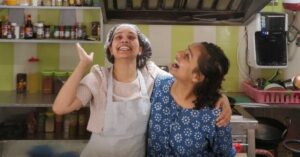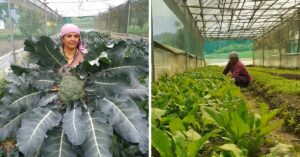Sikkim Teacher Upcycles 85,000 Plastic Packets Into 6100 Book Covers, Empowers Rural Women
“Being a teacher, I am always concerned about issues related to the village where I work. This initiative inspires cleanliness, as well as revenue,” says 35-year-old Mathematics teacher Lomas Dhungel.
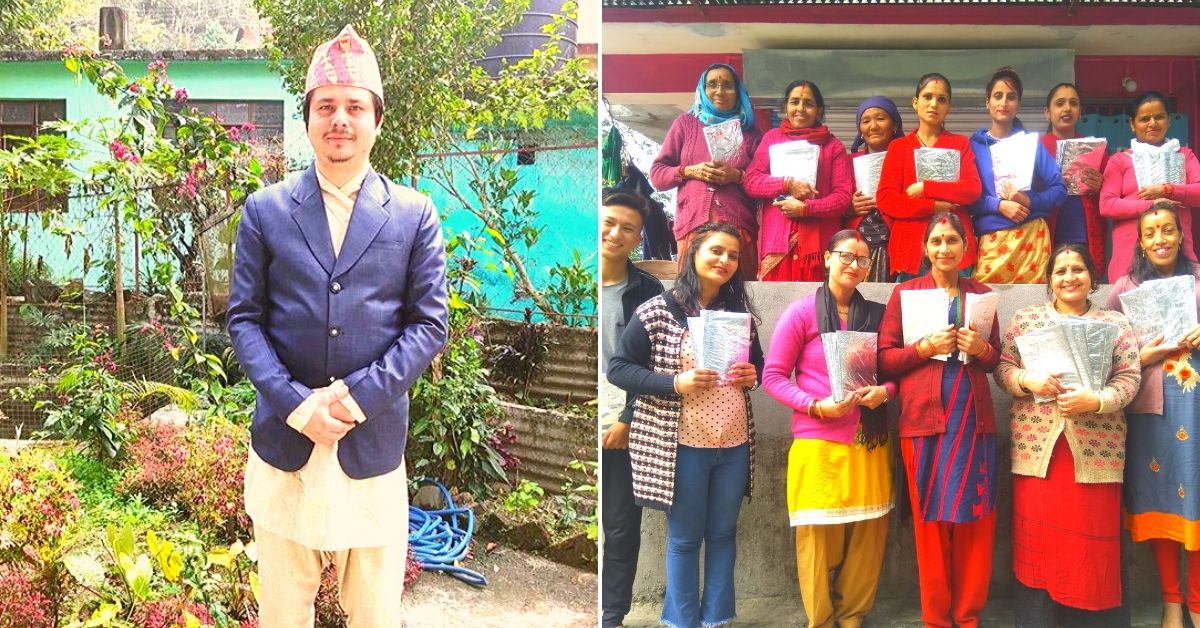
Lomas Dhungel, a 35-year-old science and mathematics teacher at the Government Senior Secondary School in Sikkim’s Makha village, is a man on a mission.
In 2015, under his project ‘Hariyo Makha–Sikkim Against Pollution’ (‘Hariyo’ is a vernacular word for ‘Green’), he began working with his students on issues concerning waste management and efficient resource utilisation through a whole host of initiatives.
The objective is to generate revenue from these initiatives and use the money to sponsor the education of those who can’t afford it.
The Better India’s “BETTER TOGETHER” initiative has brought together civil service officers from across the country as they help migrant labourers, daily wage earners, frontline workers, and all those who need our help most in these troubled times. You can join us and support them in this fight against COVID-19.
Unable to view the above button? Click here
One of the initiatives that the school teacher has led is the upcycling of plastic waste into covers for school notebooks under the Hariyo Makha project. This particular initiative has undergone two phases.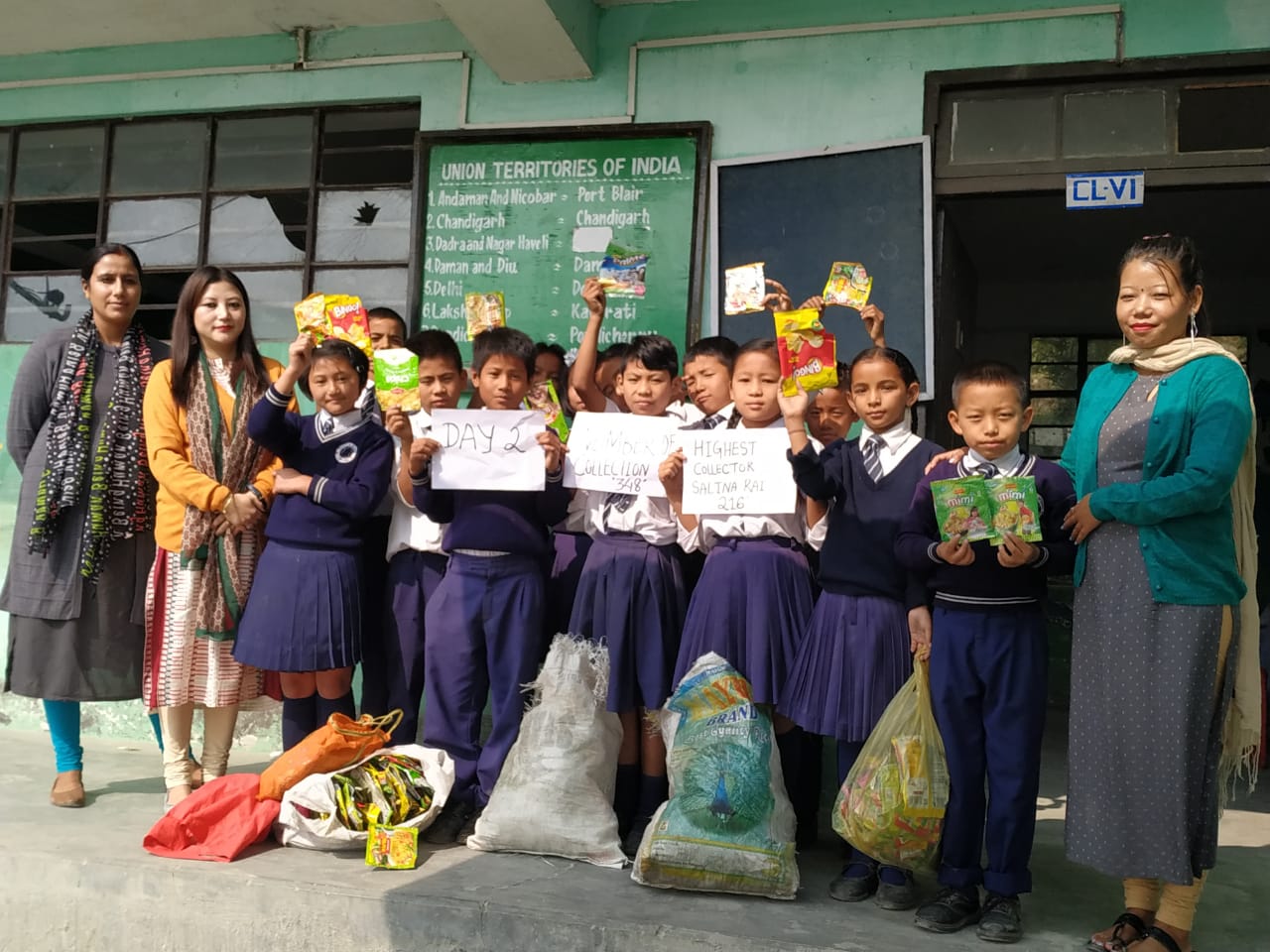
Phase One
For the first phase of the project from February 2015 to December 2019, students from his school and other educational institutions helped upcycle 55,000 pieces of plastic into covers for more than 4,000 school notebooks.
Two years before he embarked on this project, however, he began exploring the idea of recycling waste and followed that up by collecting garbage from his neighbours, segregating it and selling the dry waste to scrap dealers and recycling units.
But he recalls those two years (2013 and 2014) as a “complete failure” where he could not develop any feasible ideas.
It was only in December 2014 that he arrived at the idea of upcycling empty packets of chips, biscuits, tea leaves and plastic packets of other edible items for school notebook covers. Initially, plastic was collected from within Makha and the surrounding villages.
But as demand for plastic waste packets increased, around 10 government and private schools from East and South districts were requested to collect and donate the same from their surrounding villages.
The work received support from the nearby panchayat and the local public. Students received their basic training in plastic upcycling from him during their activity hours at school. Those interested were later asked to dedicate just 15 minutes of their time every day for such work.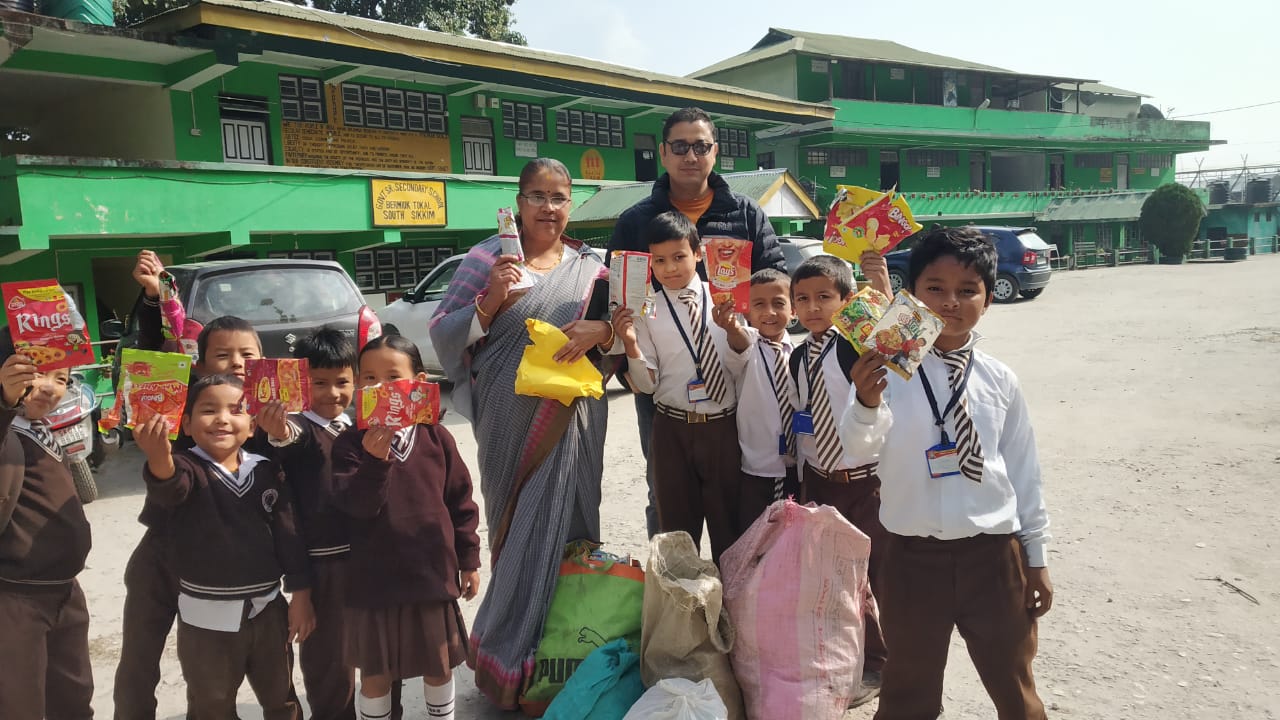
“Following the initial success of our work, we enlisted the support of local scholars around Makha. We approached the Principal of Adarsh Vidhya Mandir (AVM), a nearby feeder school, and requested him to allow us to cover all the books and copies of their school for the second half of the 2016-17 academic session. We completed our task by March 2017, earning Rs 14,000 in total,” says Dhungel.
The revenue earned in 2017 out of books covers of AVM was utilised in helping one underprivileged student obtain admission into the Indira Gandhi National Open University (IGNOU) for an undergraduate course.
Between 2015 and 2019, his team has shared their ideas with more than 20 schools and institutions all over Sikkim. All training modules and ideas are shared with interested volunteers for free.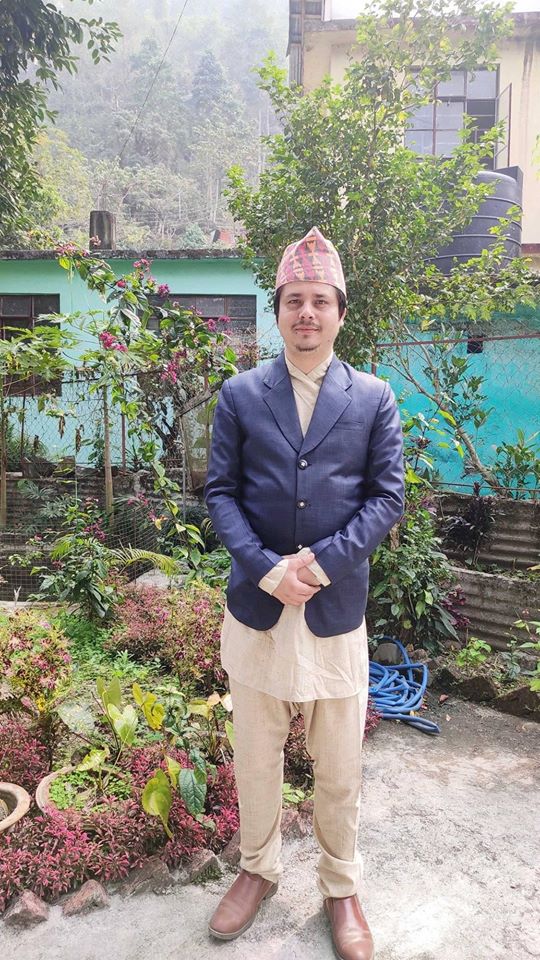
Phase Two
Working continuously since 2015 on the idea of upcycling of plastic wastes from eatables, Dhungel shared his big idea with the Ajambari Self Help Group (SHG) of Singbel, East Sikkim, which is 3 km from Makha, for the second phase of their work.
With active support from AVM, which is also located at Singbel, the project sought to empower the women-run SHGs. They would cover all the notebooks of AVM students with the upcycled plastics after adopting a healthy and hygienic mechanism for its cleaning. For this purpose, a plastic collection centre was established at Singbel in November 2019 last year.
The main challenge was not just to successfully upcycle plastic waste, but also develop an experiment in establishing a successful ‘Working model on Seasonal Employment,’ claims a document issued by Hariyo Makha.
“A joint meeting was conducted with 5 different SHGs at Singbel in September 2019, of which one was chosen for the main upcycling work. The members of SHGs were mainly guardians of the students taught by us at the Makha Senior Secondary School. So, most of them were familiar. Around 60 women from 5 SHGs namely Ajambari, Udaan, Smarika, Chandni, and Ujjwal were engaged in collection of plastics, while the main task of upcycling was done by the Ajambari,” claims Dhungel.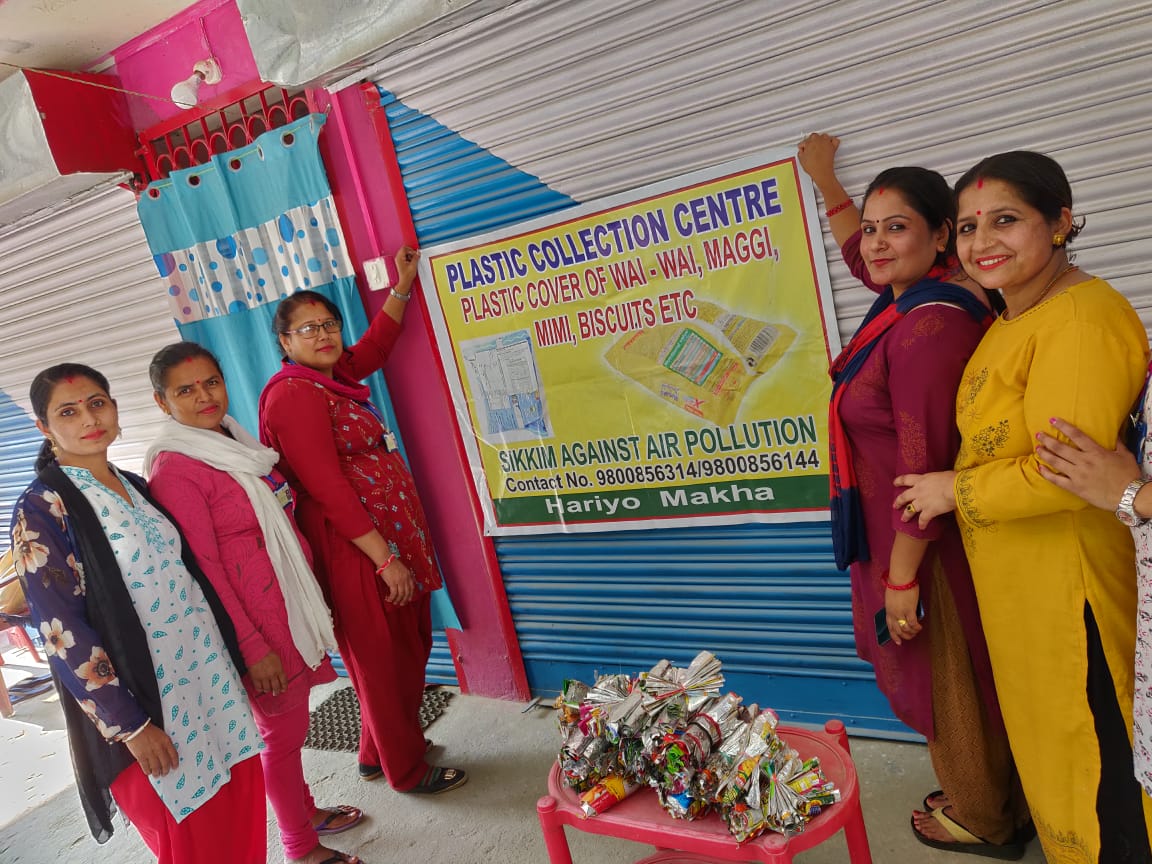
Within four months, more than 300 volunteers including locals, students and teachers from 12 government and 2 private schools from East and South districts of Sikkim collected and donated around 30,000 plastic pieces to the SHG.
The plastic pieces were collected from the areas in and around the 14 volunteer schools, and from different villages surrounding them. Some local volunteers also assisted in the collection work. Large-sized plastics were primarily collected for upcycling. All notebooks and copies for the entire 2020 AVM school batch were eventually covered under this project.
“Our work was merely covering the books. We were very thankful for receiving training under the Hariyo Makha initiative. Only if we work together, can we hope for a better future,” says Krishna Sharma (40), a member of the Ajambari.
By the first week of March, more than 2100 books and copies were covered by the SHG also earning revenues amounting to over Rs 21,000. The SHG charged the school Rs 10 per book.
A part of the revenue will be used in helping at least two female SHG members finish their school education. Due to difficult circumstances, many women working in these SHGs had dropped out of schools nearly 15 years ago. This is their chance at finishing what they started. All the money earned, alongside voluntary contributions from his side, is being utilised exclusively to help needy students fund their education.
Meanwhile, students of AVM whose books were covered with the upcycled plastic pieces further disseminated the knowledge they obtained on effective upcycling to their villages. “For our Third Phase, we are also working with the ENVIS Department, Rural Development Department (RDD) and the State Pollution Control Board (SPCB) for helping at least 10 more SHGs and NGOs in Sikkim that would eventually work in upcycling 5,00,000 more plastic pieces,” says Dhungel.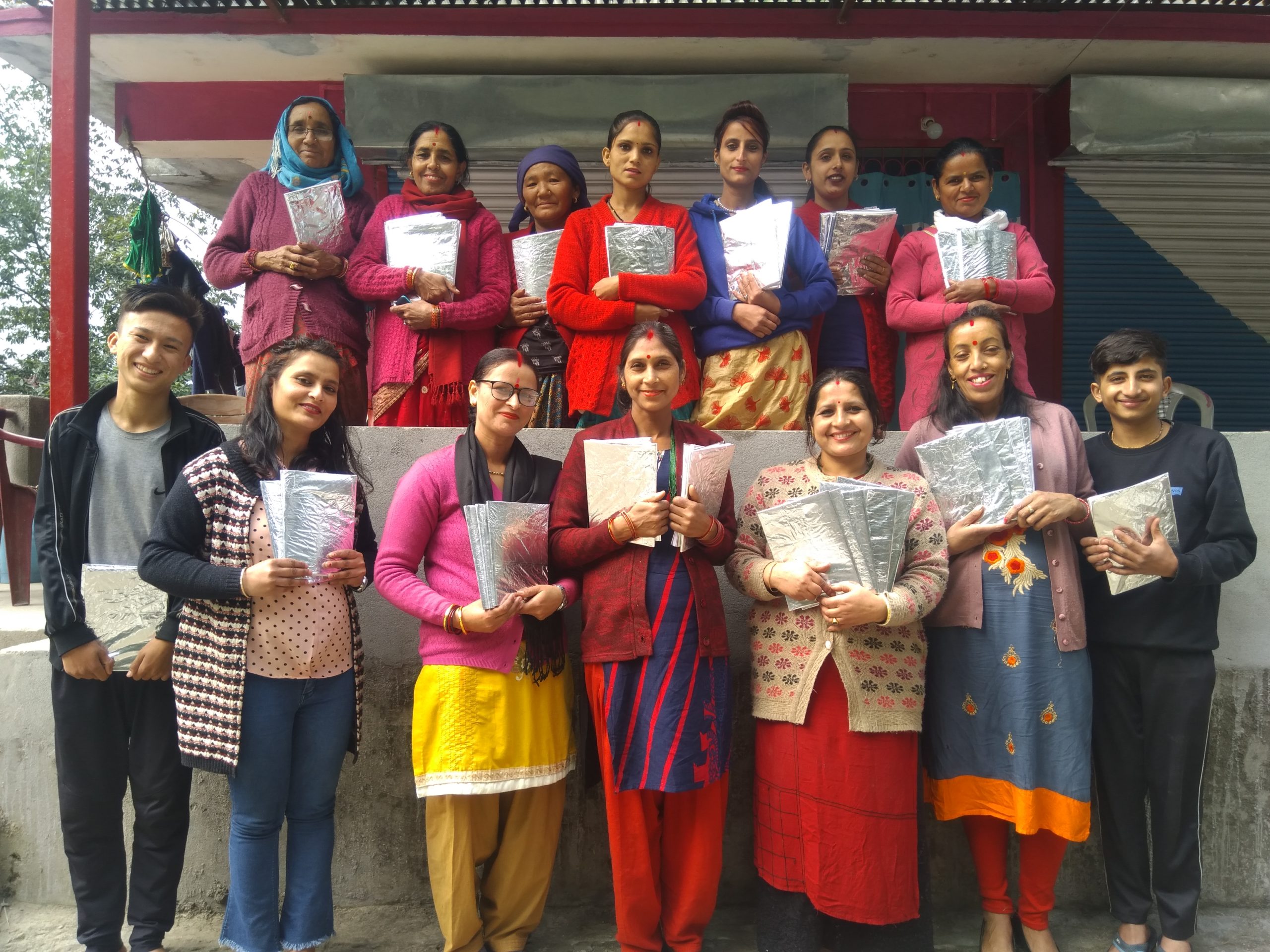
The man truly believes that the idea has the potential to be implemented on a national scale. So far, his projects have helped a total of 7 students obtain admission into NIOS and IGNOU, with hopes to help at least an additional 5 more this year.
“Being a teacher, I am always concerned about issues related to access to education in the village where I work. During my discussions with self-help groups, I had found that due to several family problems most women there were unable to complete their education. This initiative would inspire both cleanliness, as well as revenue that could also be utilised in helping them restart their education,” says Dhungel.
In operating a ‘Book Covering Unit’ utilising waste plastic pieces, these initiatives are not only eliminating pollution and other demerits arising due to improper disposal, but also offering employment opportunities.
This idea is sustainable, cheap and with zero by-product emission. Moreover, it can generate ‘seasonal employment’ across each and every corner of India with a zero dependence on raw materials.
Also Read: Xiaomi to Kabbadiwalas: Gurugram Firm Helps Recycle 6000 Metric Tonnes of E-Waste
(Edited by Gayatri Mishra)
Like this story? Or have something to share? Write to us: [email protected], or connect with us on Facebook and Twitter.
This story made me
- 97
- 121
- 89
- 167
Tell Us More
We bring stories straight from the heart of India, to inspire millions and create a wave of impact. Our positive movement is growing bigger everyday, and we would love for you to join it.
Please contribute whatever you can, every little penny helps our team in bringing you more stories that support dreams and spread hope.






